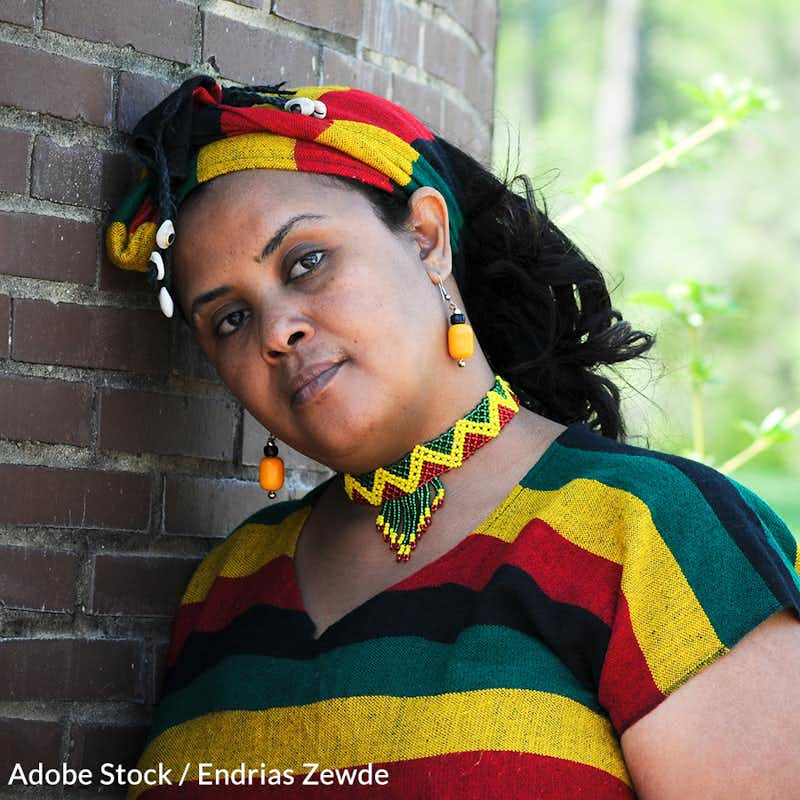Ensure a Bright Future for Women in Ethiopia
16,114 signatures toward our 25,000 Goal
Sponsor: The Hunger Site
Many Ethiopian women face slave labor and sexual repression. Take action!

Many Ethiopian women face a heartbreaking choice before they even turn 16 years old: they must choose between marriage or face intense manual labor and sexual slavery if they leave home1. It's a life doomed for violence and injustice.
A state-led industrial drive has transformed Ethiopia into one of Africa's fastest-growing economies, yet over a third of its 99 million citizens still live in extreme poverty, on less than $1.90 a day2.
Girls are often regarded as a financial burden on their families in the Horn of Africa country long blighted by cycles of disease, drought, hunger and conflict, and expected to drop out of school to get married or find employment3.
"When a child is born a girl in Ethiopia... she is born into servitude. She is literally there to serve the family," Bogaletch Gebre, who grew up in the 1960s in Kembatta, southern Ethiopia, told Reuters. "It's a tragedy."
These girls don't have to suffer.
The Bright Future program, or Biruh Tesfa in Amharic, in Addis Ababa, Ethiopia helps low-income women and girls become assimilated into society by providing them academic education, life skills, and reproductive education4.
Bright Future helps these girls build their social support and improve skills to prevent HIV infection, while mentors help the girls realize their true potential. The project uses a combination of house-to-house recruitment, formation of girls' groups by female mentors, and education on HIV/AIDS, life skills, and basic literacy.
According to a paper published in "Vulnerable Children and Youth Studies5," Bright Future is leading to positive changes, and showing how other well-designed programs can reach and effectively support the most vulnerable girls in the poorest areas, such as child domestic workers and rural-urban migrants.
Sign the petition telling UN Secretary to officially support the Bright Future Program, a monumental step in preventing violence against women.
- Dr. Eliana Riggio Chaudhuri, ECPAT International, Plan International (October 2015), "Unrecognised Sexual Abuse and Exploitation of Children in Child, Early and Forced Marriage."
- The Tony Blair Institute for Global Change (20 January 2020), "Reflecting on the "how" of Ethiopia's industrialisation push."
- Tom Gardner, Reuters (23 November 2016), "Ethiopian women face new threat of human trafficking as economic gains slow to trickle down."
- Population Council (2021), "Biruh Tesfa ("Bright Future")."
- Annabel Erulkar, Abebaw Ferede, Woldemariam Girma, Worku Ambelu, Vulnerable Children and Youth Studies (2 November 2012), "Evaluation of "Biruh Tesfa" (Bright Future) program for vulnerable girls in Ethiopia."
The Petition:
Dear UN Secretary,
I am writing to express my support of the Bright Future program in Addis Ababa, Ethiopia. In a region where violence, both physical and sexual, runs rampant, we need programs such as these to support women who need help.
Many girls in Ethiopia today face grim prognoses for their futures; women are often forced into intensive manual labor or sold off for sex in the sex trade. The best way to combat these horrible realities is to educate those who are at risk. The more information, assistance, and support we can provide these women, the more equipped they will be to recognize where there might be potential violence and to plan accordingly.
The Bright Future program is helping countless women escape from a bleak fate and become productive citizens in society. Please support Bright Future, and make all violence against women a thing of the past.
Sincerely,
 Welcome Back! Log In to Continue
Welcome Back! Log In to Continue